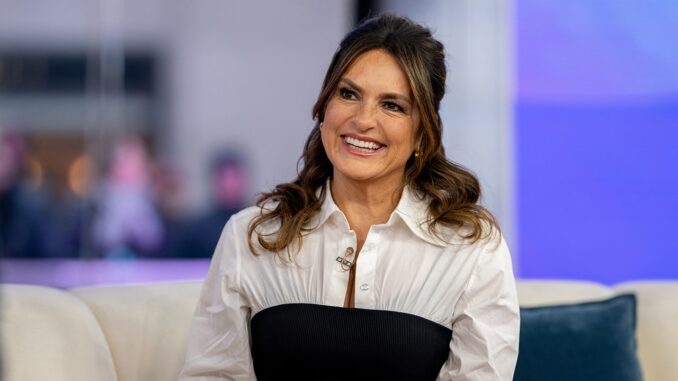
Okay, here's an illustrative essay exploring why a specific romanticized "Benson & Stabler" scenario, as envisioned by some, might be detrimental to Law & Order: SVU and its characters.
Mariska Hargitay's Dream Benson & Stabler Scenario Is The Worst Thing That Can Happen To Law & Order
For over two decades, Olivia Benson and Elliot Stabler have been cornerstones of the Law & Order: Special Victims Unit franchise. Their partnership, a volatile mix of fierce loyalty, unwavering support, and unspoken affection, captivated audiences. The will-they-won't-they tension was a constant undercurrent, a source of both frustration and fascination. However, the nostalgic desire for a specific, idealized "dream scenario" where Benson and Stabler finally become a traditional romantic couple risks undermining the complex, nuanced relationship they've cultivated, and ultimately, damaging the very essence of SVU.
The allure of a Benson and Stabler romance is undeniable. After years of witnessing their deep connection, many fans long for a resolution, a confirmation that their bond transcends the professional. Mariska Hargitay herself has spoken of her own hopes for their future, fueling the narrative that a romantic union is the ultimate endpoint. This "dream scenario" typically involves a grand confession of love, a sunset ending where they finally embrace their feelings and ride off into the happily-ever-after. But this is precisely where the danger lies.
Firstly, forcing a romantic resolution risks simplifying a profoundly complex relationship. Benson and Stabler's bond was forged in the crucible of trauma, navigating the darkest corners of human depravity together. Their connection is built on shared experiences, mutual respect, and an unspoken understanding that transcends mere romantic love. To reduce this intricate tapestry to a simple love story would be a disservice to the depth and authenticity of their partnership. Imagine the nuance being lost to generic romantic tropes – forced dialogue, predictable conflicts, and a sanitized portrayal of intimacy that clashes jarringly with the gritty realism of SVU. The very things that make their relationship compelling – the unspoken tensions, the quiet acts of support, the fierce protectiveness – could be sacrificed at the altar of romantic fulfillment.
Secondly, a "dream scenario" romance could compromise Olivia Benson's character arc. Benson's journey has been one of self-discovery, resilience, and empowerment. She has risen through the ranks, becoming a beacon of hope for survivors and a powerful force for justice. Her strength lies in her independence, her ability to navigate a male-dominated world and advocate for the vulnerable. To suddenly define her by her relationship with a man, even one as significant as Stabler, would diminish her hard-earned autonomy. It would suggest that her ultimate fulfillment lies in romantic partnership, reinforcing the tired trope that a woman needs a man to be complete. Instead of celebrating Benson's complex identity as a survivor, a leader, and a compassionate human being, the show would risk reducing her to a lovestruck partner, undermining the powerful message of female empowerment it has so consistently championed.
Furthermore, the idealized "dream scenario" ignores the practical realities and potential consequences of a romantic relationship between Benson and Stabler. Stabler's history is fraught with impulsive decisions and a struggle to balance his personal life with the demands of his work. His abrupt departure from SVU years ago, leaving Benson without a word, highlights his flaws and the potential for instability in any relationship he enters. To gloss over these complexities and present a picture-perfect romance would be disingenuous and ultimately unsatisfying. The inevitable conflicts, the strain on their professional lives, and the potential for heartbreak would likely overshadow the initial romantic bliss, creating a storyline that feels contrived and out of sync with the show's established tone. Moreover, it could alienate viewers who appreciate the show's focus on the victims and the complexities of the legal system, shifting the narrative towards a more melodramatic, relationship-driven focus.
Finally, the pursuit of a specific "dream scenario" risks stagnating the show's creative potential. SVU has thrived on its ability to adapt and evolve, tackling timely and relevant social issues. Fixating on a pre-determined romantic endgame for Benson and Stabler could limit the writers' freedom to explore new storylines and character dynamics. Instead of embracing the uncertainty and complexity of their relationship, the show would be forced to adhere to a pre-ordained narrative, potentially sacrificing its creative integrity and its ability to surprise and challenge its audience.
In conclusion, while the desire for a romantic resolution between Olivia Benson and Elliot Stabler is understandable, the idealized "dream scenario" that many fans envision carries significant risks. It threatens to simplify their complex relationship, undermine Benson's character arc, ignore the practical realities of their situation, and stifle the show's creative potential. Instead of forcing a romantic union, Law & Order: SVU should continue to explore the nuances of their bond, allowing their relationship to evolve organically and authentically. The true strength of Benson and Stabler's connection lies not in romantic fulfillment, but in the unwavering support, mutual respect, and deep understanding that has defined their partnership for over two decades. It's a bond that transcends the boundaries of traditional romance, and that is precisely what makes it so compelling. Preserving that unique dynamic is far more valuable than chasing a fleeting, and ultimately detrimental, "dream scenario."
